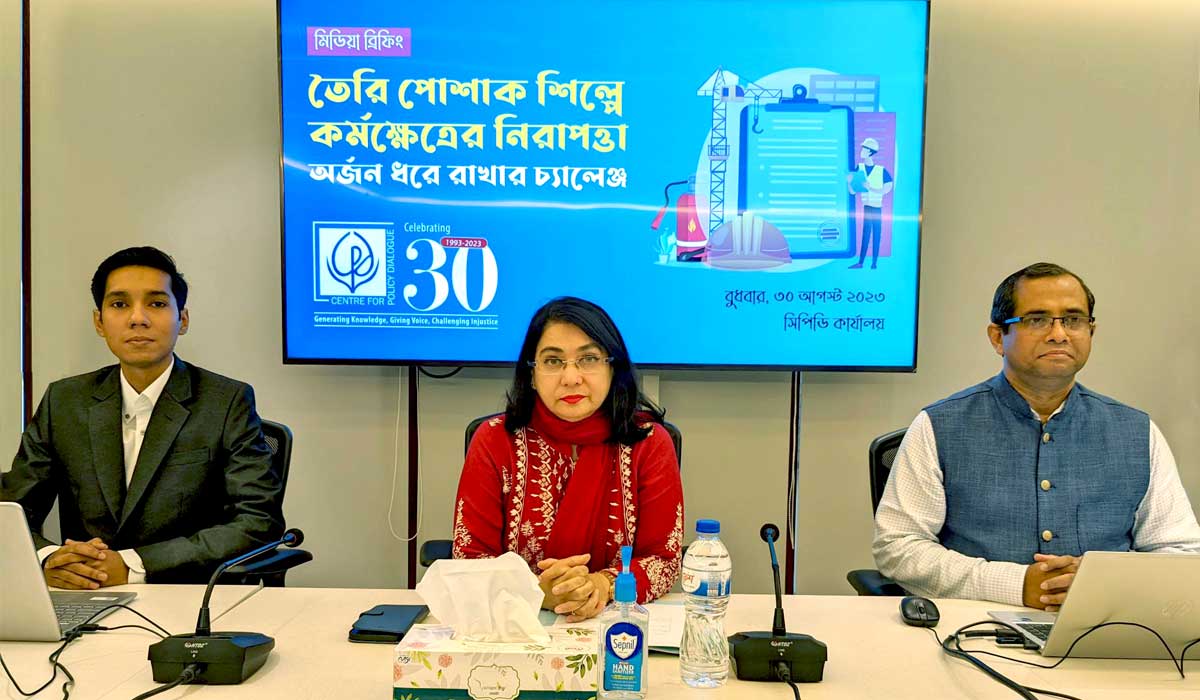
The Centre for Policy Dialogue (CPD) relaunched the initiative ‘Civil Society Monitoring on Occupational Safety and Health (OSH)’ in 2023, mirroring the efforts undertaken in 2014 after the Rana Plaza incident. The initiative’s main objective is to undertake open, critical, and independent civil society monitoring and reporting of the functioning of Bangladesh’s public and private sector monitoring initiatives and measures.
Under this initiative, the studies titled ‘Emerging Concerns of Occupational Safety and Health of the RMG Industry: Role of Public and Private Monitoring Agencies’ and ‘Maintaining Workplace Safety in RMG Factories during 2023 – How Effectively is RSC Fulfilling Its Role’ were conducted.
Based on the findings of these studies, the media briefing titled ‘Monitoring Workplace Safety in the RMG Sector: Is Bangladesh Still a Pioneer or Learner?’ was organised on 30 August, 2023 at the CPD premises.
The study observed that despite progress in workplace safety, a decrease in inspections, lower remediation progress, and underreporting of accidents remain key concerns for DIFE. The study also finds that while RSC, Nirapon, and RCC collectively oversee 2,896 factories (with potential overlap between them), there are currently 856 RMG factories not subject to any inspection mechanism. This implies that at least 22.8 per cent of factories lack coverage from private or public monitoring efforts.
Dr Fahmida Khatun, Executive Director, CPD, chaired the session and said, ‘The RMG sector is a major contributor to Bangladesh’s export earnings. With the impending graduation from its LDC status, Bangladesh will lose certain preferential trade benefits. Therefore, it is crucial to prioritise safety and other compliances to ensure that Bangladesh can maintain its competitive advantage after graduation.’
While discussing the findings of these studies, Dr Khondaker Golam Moazzem, Research Director of CPD, said ‘Regrettably, in 2023, workplace accidents continue. For instance, on February 19th, a worker died in a building collapse, and on May 1st, a fire injured 18 workers. As of 30 July, 2023, at least three RMG Sustainability Council (RSC) covered factories reported workplace accidents.’
Mr Tamim Ahmed, Senior Research Associate, CPD, underscored ‘The Department of Inspection for Factories and Establishments (DIFE) has enhanced its technical and institutional capacity with a larger workforce and more skilled inspectors, although it is still inadequate.’ He pointed out it is unclear that despite the increased capacity and availability of digital labour inspection mechanisms, what led to 43 percent decline in DIFE’s factory inspections in the RMG industry in the fiscal year 2021-22.
The Senior Research Associate highlighted that there is room for enhancing both operational and institutional effectiveness of RSC. This involves refining its inspection process, management of remediation protocols, training effectiveness, and speed of addressing OSH-related complaints.
Dr Moazzem emphasised the need for the DIFE to further enhance its technical and institutional capacity in his recommendations for strengthening safety monitoring in Bangladesh. The Licensing Industry Merchandiser’s Association’s (LIMA’s) importance for DIFE is notable, but it needs full functionality. DIFE should consistently partner with private agencies for inspections, enhancing inspection quality. Granting DIFE legal power to shut hazardous buildings would enable more proactive safety efforts.
He proposed forming an International Accord Forum. This would let Bangladesh share its RMG expertise with participant countries, while also learning from their new mechanisms if implemented.
He emphasised the need to implement the National Plan of Action (NAP) on OSH. He also recommended exploring tax cuts for safety equipment accessibility, gender-responsive transformations in monitoring agencies, and initiating a comprehensive employment injury insurance scheme within the RMG industry.
An open-floor Q&A session with journalists from both print and electronic media followed the discussion. The study team responded to the questions and said that the DIFE and successors of Accord and Alliance, the RSC and Nirapon, should follow the path established by these two initiatives. DIFE should oversee Nirapon to ensure the transparency of their data. Safety conditions in the RMG sector have witnessed significant improvements over the past decade. Factory work environments and relationships with foreign brands have both advanced, alongside enhanced monitoring. However, there remains substantial room for further improvement.

